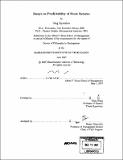Essays on predictability of stock returns
Author(s)
Rytchkov, Oleg
DownloadFull printable version (9.146Mb)
Other Contributors
Sloan School of Management.
Advisor
Jiang Wang.
Terms of use
Metadata
Show full item recordAbstract
This thesis consists of three chapters exploring predictability of stock returns. In the first chapter, I suggest a new approach to analysis of stock return predictability. Instead of relying on predictive regressions, I employ a state space framework. Acknowledging that expected returns and expected dividends are unobservable, I use the Kalman filter technique to extract them from the observed history of realized dividends and returns. The suggested approach explicitly accounts for the possibility that dividend growth can be predictable. Moreover, it appears to be more robust to structural breaks in the long-run relation between prices and dividends than the conventional OLS regression. I show that for aggregate stock returns the constructed forecasting variable provides statistically and economically significant predictions both in and out of sample. The likelihood ratio test based on a simulated finite sample distribution of the test statistic rejects the hypothesis of constant expected returns at the 1% level. In the second chapter, I analyze predictability of returns on value and growth portfolios and examine time variation of the value premium. As a major tool, I use the filtering technique developed in the first chapter. I construct novel predictors for returns and dividend growth on the value and growth portfolios and find that returns on growth stocks are much more predictable than returns on value stocks. Applying the appropriately modified state space approach to the HML portfolio, I build a novel forecaster for the value premium. Consistent with rational theories of the value premium, the expected value premium is time-varying and countercyclical. In the third chapter, based on the joint work with Igor Makarov, I develop a dynamic asset pricing model with heterogeneously informed agents. (cont.) I focus on the general case in which differential information leads to the problem of "forecasting the forecasts of others" and to non-trivial dynamics of higher order expectations. I prove that the model does not admit a finite number of state variables. Using numerical analysis, I compare equilibria characterized by identical fundamentals but different information structures and show that the distribution of information has substantial impact on equilibrium prices and returns. In particular, asymmetric information might generate predictability in returns and high trading volume.
Description
Thesis (Ph. D.)--Massachusetts Institute of Technology, Sloan School of Management, 2007. Includes bibliographical references.
Date issued
2007Department
Sloan School of ManagementPublisher
Massachusetts Institute of Technology
Keywords
Sloan School of Management.